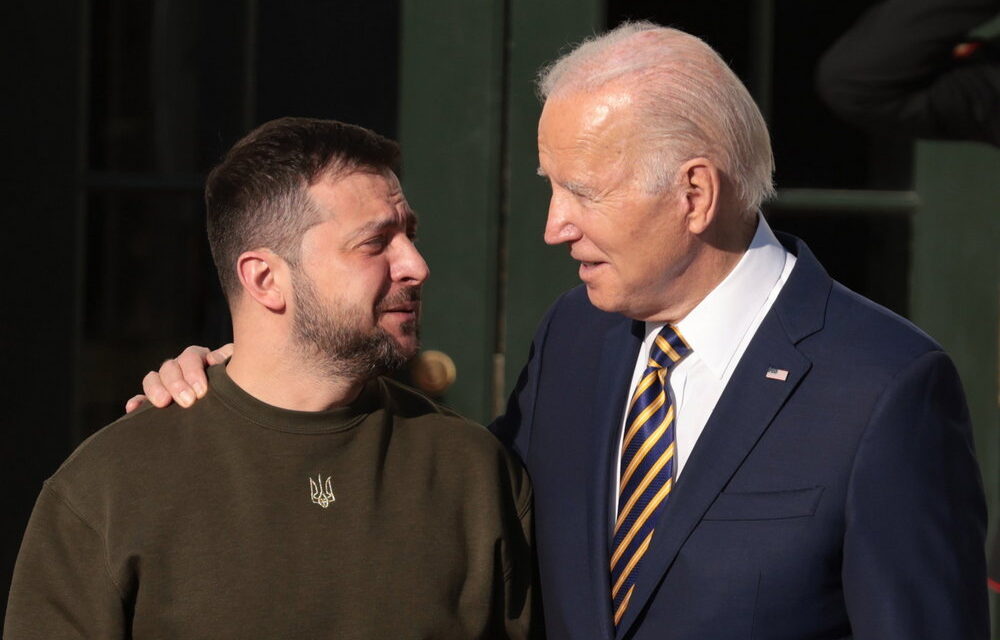Washington is risking war in Europe to try to repair a self-inflicted disaster. Stephen Bryen, who previously also worked as the political deputy of the Minister of Defense, outlines the American policy in Ukraine and its possible consequences, which are not very encouraging for Europe, in his breath-taking analysis.
The Biden administration wants Ukraine to pull it out before the U.S. presidential election in November, but there's a risk that won't happen, especially if Russia does launch a major offensive in the near future. That is why a new plan is emerging, which can be observed not on paper, but in political practice, a former high-ranking American official believes.
“When Ukrainian President Volodymyr Zelensky decided to fire Valery Zaluzhny, the commander of the armed forces, US Assistant Secretary of State Victoria Nuland, who is directly responsible for US and NATO policy on Ukraine, rushed to Kiev.
No joint photos were taken with Nuland and Zelenskyi. He briefed the press standing outside, in front of a hastily set up table with a couple of microphones on it. Why did Nuland rush to Kiev? He was almost certainly instructed by the White House to go there immediately, in case things went wrong in the Ukrainian capital.
Apparently, they were seriously worried that Zaluzhny might use the army to turn against Zelensky."
- writes Stephen Bryen, who previously served as Director of Personnel Affairs at the Senate Foreign Relations Committee's Middle East Subcommittee and as Political Assistant to the Secretary of Defense.
The former high-ranking official writes in his article published on the website of Weapons and Strategy: "Until now, Zaluzhny has not taken action. Of course, he still can, so we assume that Nuland wanted to talk to Zaluzhny rather than Zelensky in Kiev. There is no public record of the meeting, but it appears that Nuland's role was to calm Zaluzsny and get him to behave."
Bryen points out that although Washington does not officially say anything about the military change of guard in Kiev, it emphasizes in public that it considers it a Ukrainian internal matter, "of course, this is a complete impossibility.
Even before 2014, Washington was manipulating the internal politics of Ukraine in its own interests, and Nuland was at the end of the fuse.”
"Zaluzhnyi's replacement was not a surprise either. Someone must take responsibility for the failure of Kiev's so-called counteroffensive and the waste of billions of dollars in American equipment and supplies."
Bryan states.
He adds: "It is also not surprising that things have now turned even worse, as Ukraine will soon have to reckon with the loss of Avgyivka, and the newly reinforced Russian army is pushing towards the Dnieper, targeting Kiev."
As he writes: "Kiev's ever-increasing casualties of more than a thousand a week are making a strong impression on public opinion, reinforcing the view that the war has gone wrong."
Bryen also touches on a phenomenon that is in Hungarian-language news reports : in order to recruit, Kiev resorts to harsh, unpopular measures, including threats and intimidation.
Zelensky will not negotiate with Russia, according to Bryen, because Washington opposes any negotiation, as it sees it as a potential defeat for NATO, as the result would be the destabilization of the defense alliance.
But how could Kiev hold out if Russia actually launched another large-scale military operation in Ukraine? - asks the author.
As soon as there is a real Russian breakthrough on the current front line and the Ukrainian forces begin to retreat, it will be almost impossible for the Zelenskyi government to survive in Kiev, Bryen believes.
"Under these circumstances, there are already signs that they are planning to move the Ukrainian government further west, probably to Lviv, near the Polish border. The Poles are already saying that they might also deploy their nearby air defenses to protect the city. Why do they say that? Because they are preparing a plan to stop the Russians with the Polish Patriot and other air defense equipment, and even according to the idea, they will send Polish brigades, which will be reinforced with NATO equipment. The British are already preparing public opinion and are openly talking about sending their special forces to save Ukraine," he writes.
Bryen says anyone looking at the map should realize that NATO can only effectively protect the Zelenskyi government if it does so near the Polish border, which is far enough away from Russian missiles.
Unless, of course, he adds, if the de facto or de jure dismemberment of Ukraine takes place, according to which the western part will remain somewhat independent, while the rest will be subject to the agreement that the Russians want to introduce.
Bryen believes that nothing will change if the Russians continue to grind down the Ukrainian military sluggishly, but the war in Ukraine could reach a turning point for both military and political reasons.
"By moving the Ukrainian government to Lviv and gaining the support of Poland and the UK (…) Biden would buy time, although the end result would be either a war in part of Europe (Poland, the Baltic states) or a stalemate accepted by Russia and NATO ” outlines the possibilities.
According to Bryen, President Joe Biden would get away with it for a while, but this scenario is already a strategic disaster in the medium term.
"Of course, Biden is aware that he would not survive another disaster similar to Afghanistan"
he adds.
The former senior official also notes,
British enthusiasm for war was due to pressure from Washington.
"British forces lack the materiel, buoyancy and cover to do anything, and it's foolish to think the Russians won't fight back," Bryen bluntly states.
According to him, all of this easily reminds one of the famous attack of the British light cavalry (when, in the Crimean War - throwing the logic of warfare into silence - they charged the Russian cannons head-on and suffered heavy losses - ed.).
Bryen believes that the behavior of the British gives the impression that it is only intended to scare the Russians. Just as much of Washington's Ukraine policy has been based on exaggerating the value of American weapons and other support, and on the wishful thinking that Russia would withdraw from the conflict.
"Any look at Russian history going back to Napoleon should have suggested that Russia was not going to back down"
- underlines.
"Nuland has created a disaster with the full support of the Biden-Obama team,
(…) Washington continues to risk war in Europe, even nuclear war, to try to correct the disaster it has caused.
Washington and Nuland are practically trying to rearrange the deck chairs on the Titanic”
- Bryen sums up the essence of the American policy on Ukraine.
Source of the article: Bidens New Ukraine Policy – Trying to Rearrange the Deck Chairs on the Titanic
Source: hirado.hu
Cover photo: Ukrainian President Volodymyr Zelenskyi (b) is welcomed by US President Joe Biden at the White House in Washington on December 21, 2022.
This is Zelenskyi's first trip abroad since the start of the war launched by Russia against Ukraine in February. MTI/EPA/Sipa USA pool/Oliver Contreras












